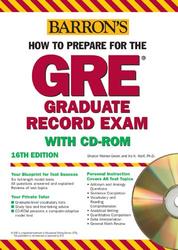 GRE stands for Graduate Record Examination. It’s a commercially run standardized test whose scores are used by many graduate schools in the U.S. and a few other nations as an admission criterion. The exam is administered by ETS (Educational Testing Service). As such admissions in graduate schools depend on a combination of various factors like undergraduate performance, letters of recommendation and scholastic achievements and the level of emphasis that different schools put on GRE scores may vary but a poor GRE score may drastically narrow down your options.
GRE stands for Graduate Record Examination. It’s a commercially run standardized test whose scores are used by many graduate schools in the U.S. and a few other nations as an admission criterion. The exam is administered by ETS (Educational Testing Service). As such admissions in graduate schools depend on a combination of various factors like undergraduate performance, letters of recommendation and scholastic achievements and the level of emphasis that different schools put on GRE scores may vary but a poor GRE score may drastically narrow down your options.
The exam is divided into three parts – There’s also an experimental section but its score is not included in the reported score sheet.
Analytical Writing: This consists of an issue task and an argument task. In the former you’ll be asked to write an essay on one of two given topics. The allotted time is 45 minutes. There’s not much you can do to prepare for it before you’ve actually seen the topics. The idea is to plan wisely before actually typing your answer. I’d say think of three to four connected themes and write a paragraph on each of them. Logical clarity is more important here than sophisticated handling of English language. Of course grammatical mistakes count and you’re best advised not to be too adventurous here. The latter task consists of an argument. It could be a paragraph on, say, why tobacco should be banned (Are you kidding?). You’ll be asked to write a critique on this piece in thirty minutes. These (obviously) need not be your honest views. All that matters is that your essay should be relevant not only to the issue in hand but also to what the given piece has to say about it. You may support the logic behind it (if there is one) or criticize it and/or suggest improvements. The crux of the matter is: You need not be an expert on the subject at hand. The topics are almost always chosen so as to represent issues that most college students should be aware of irrespective of the field in which they are majoring.
 Verbal Ability: The verbal section consists of multiple choice questions about analogies, antonyms, sentence completions, and reading comprehension passages. The key to achieving a good score here is good vocabulary. It could have been cultivated throughout your life span or only two months before the exam. It doesn’t matter. The point is when you see those words staring at your face you should be able to identify the correct option. Educated guessing could do wonders and you’re encouraged to do so but don’t just trust your luck. Memorize the Barron’s word list – Buy a copy, hard or soft. But then there are also the comprehension passages which could be a deciding factor between an okay score and an excellent score. The word of the day is: Practise. Don’t panic when you see a long passage. Work your way through it. Fool yourself into believing that the contents of the passage are interesting. Good concentration ability is very helpful here. Always keep in mind that the scores in verbal section are much lower than those in the quantitative section. It may happen that you might leave the exam venue thinking that you completely screwed this section but you might not.
Verbal Ability: The verbal section consists of multiple choice questions about analogies, antonyms, sentence completions, and reading comprehension passages. The key to achieving a good score here is good vocabulary. It could have been cultivated throughout your life span or only two months before the exam. It doesn’t matter. The point is when you see those words staring at your face you should be able to identify the correct option. Educated guessing could do wonders and you’re encouraged to do so but don’t just trust your luck. Memorize the Barron’s word list – Buy a copy, hard or soft. But then there are also the comprehension passages which could be a deciding factor between an okay score and an excellent score. The word of the day is: Practise. Don’t panic when you see a long passage. Work your way through it. Fool yourself into believing that the contents of the passage are interesting. Good concentration ability is very helpful here. Always keep in mind that the scores in verbal section are much lower than those in the quantitative section. It may happen that you might leave the exam venue thinking that you completely screwed this section but you might not.
Quantitative Ability: This consists of a bunch of (around 28) multiple choice questions on high school mathematics. Allotted time is 45 minutes. If you have a science/math background (at say 10+2 level) you should be fine. If you don’t, try solving the plethora of questions in one of the many problem books on the subject – I recommend Barron. A score of 800/800 is very common here. And this is almost always a high scoring exam. I’d therefore advise against overconfidence. Do your computations sincerely and you’ll be amply rewarded.
There are standard demo testing softwares (e.g. by Kaplan and Barron) which you should try on your pc before the day of the exam. The scores might not mean much but those hours may boost up your confidence.
Do post your queries here if you’ve any.

Hey, have you seen this news article?
New details about Michael Jackson’s Death Emerge
I was wondering if you were going to blog about this…
[…] How to crack GRE? – Abhishek Kumar […]
Hi
Thanks for the wonderful info.
I have 2 questions.
1)Can i do Barrons for verbal and then solve powerprep?Will that be enough or i need to do Big book also…
2)I heard that Barrons is not enough for Quant.Its questions are very easy..is it true?
If yes please tell me whatelse i need to do with barrons for quant in order to achieve a 800 score on it.
Please answer me i will be greatful.
Thanking you in advance.
hiiii … i am an engineering student(doing b-tech in IT ) . i want to know whether there will be any questions specific to my stream also.